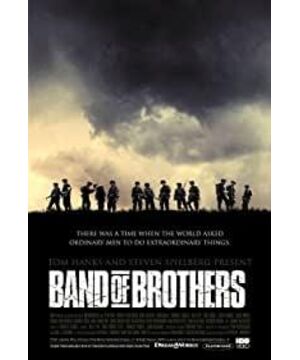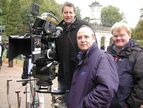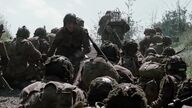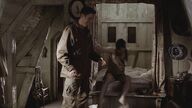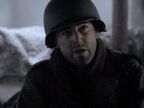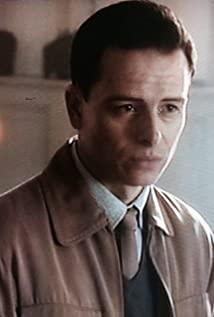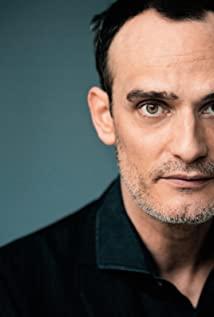This episode is the most exciting episode of the 5 episodes I have seen, and its excitement even surpasses many war movies I have seen. A TV series can be rich in content, compact in plot, full of characters, independent narrative, and linking the past, it can only be used perfect To describe it, in fact, you can see that by paying attention to the last person's subtitles in the opening of this episode, the director of this episode is the producer of the show-TOM HANKS. A good actor with countless honours deeply rooted in the hearts of the people.
If you want to boast, you need to provide a basis. I personally summarize the following points:
Watching too many war movies, the old-fashioned thing-respect for human nature. For war film and television works, the distinction between good and evil between ourselves and the enemy is often greater than the criticism of war. War works often stand from the standpoint of the filming party to emphasize how precious their lives are and how cruel and inhumane the opponent’s soldiers are. This is itself. It is a narrow and ridiculous view of war. The atmosphere of "Brothers" lies in its full display of the quality of the US military. The Western ideology does not stop the eye or fire at me like heroes in our country. On the contrary Regarding the latter, the heroes it describes are just "doing what they should do" and use team spirit to win victory. This is the essence of "Brothers". Therefore, in this drama, there is a clip of the American soldier who loves to shoot surrender and wounded prisoners being disarmed by Winters, and there is a new recruit who missed the enemy and shot his own officer at night because of tension. The soldiers’ descriptions will “offset” Winters’ heroic deeds and prevent the overall situation from developing out of control in the direction of hero worship; on the other hand, for the first time in this episode, the conflict between self-reflection and war humanity appears, TOM HANKS was able to photograph the raid on the SS garrison on the dyke very real and very angry, but at the same time, the assault that awakened the Germans in the dream of the massacre was almost a target shooting, but Winters rushed to the high ground. The waking child soldiers started, and the subsequent raid faced hundreds of panicked German soldiers. Three US squads lined up on the raised ridge and shot the Germans running around in the open. The Germans became They were shot in groups. Although they had retreated and were still in range of the US military, they had been retreating in one direction in an orderly manner. There was even a battalion of soldiers who came out from behind another slope and "voluntarily" joined the massacred battle. ! I think what the director wants to show to the audience in this passage is the fact that the medals belonging to the winning side and the losing side have human blood attached to them. The higher your medal, the more people you kill. In many cases , You see, our American medals are obtained by such "targeting", not the charge and hand-to-hand combat that you think. The Germans were so stupid that they didn’t send sentries to guard hundreds of sleeping brothers because of their stubborn tactical thinking and the chaos of the late war organization. Note that there is absolutely no criticism of the Germans’ war crimes here, but purely out of Questioning tactics. Later, in Paris, Winters met a child who resembled the first baby soldier he shot and killed, only to discover that in fact, everyone was so cute and helpless after taking off his uniform. Critical themed itinerary. To shoot a war from such an objective standpoint, TOM HANKS really knows a lot.
2. Try listening to the flexible use of language. After a simple memory of the veteran, at the beginning is a montage that can be regarded as the most classic in the whole show. Its control of sound, picture, and movement is perfect. This clip is used as part of the flashback process to bring Winters forward. It was shown in an extremely dazzling way, and then the rhythm quickly slowed down at the moment of jumping up the slope. At this time, Winters' shooting seemed extremely sudden, and the episode began, and it was completed in one go, and the audience was immediately lifted. Appetite. In addition to editing, the best impression of this episode is the large number of thoughtful special techniques. Whether it is parallel montage or general logical narration, the director used various ingenious settings on sound and pictures to achieve a reasonable and coherent special, such as Winter Si dropped a coin on the street in Paris. He leaned over to pick it up. At this time, he cut the camera. So the person picking up the coin was a French boy, and the scene was transferred to the Paris subway. The most commendable was in Wenzhou. Tess printed battle briefings and memories of the battle through several consecutive exciting special sessions, with alternate sounds of gunshots and printed sounds, and special sessions with voice-over voice and picture counterpoints, which are not only a jump in the space before and after the trip, but also follow. In this way, a kind of alternating movement and static, fast and slow rhythmic emotions. If you want to learn how to make good use of non-post special effects technology transitions, the multiple applications in this episode are enough for us to learn from.
3. The shaping of typical characters. One of the very good traditions of "Brothers" that is different from the previous American dramas is that it has a protagonist in each episode. This character may be a meaningless little role in the other episodes, but at a certain moment he suddenly Become a hero-yes, this is also a form of anti-heroism. It is precisely because of this anti-heroism that more people have become heroes, so as to pay tribute to those who fight for peace and rise again. At the height of the country, it gives people a feeling that anyone can be a hero. The protagonist of this episode is Winters, who usually feels gentle and gentle. He has won the respect and support of the soldiers with his approachable attitude. It is in stark contrast with Sober, but when he arrives on the battlefield, his face is covered with mud. When the charge was in the front, Winterston became a bloodthirsty killer. It can be said that Winters is a very serious person. On the battlefield, he can calmly analyze the situation of the enemy and ourselves, and summarize the best offensive route and timing. , In the command post, he could sit quietly, sprinkle battle briefs with tens of thousands of words, and write novels. If you change in peacetime, such a person may only use his "quietness" to get a stable job as a small clerk, but during the war, this Yang's person can steadily climb and become E company. Leaders, from this point of view, Winters, the man we put in the almost perfect man in World War II, is actually a kind of sadness.
4. Respect for historical facts. After the disastrous defeat of Operation Market Garden, the Allies still frankly relied on ground fighting to enter the Netherlands. At this time, the elite German troops had already been transferred back to their homeland to prepare for the Ardennes counterattack, which is the long Belgian winter that begins in the next episode. Combat. In terms of history, there are no longer classic battles in the Dutch battle. The German army and the servants here are only capable of parrying, and the combat effectiveness and combat experience are questionable. The Germans are proud of the lack of discipline, so they started. There appeared the white SS troops strangling their deserters, and so on. At the same time, the US military's tactical and logistical advantages began to replace the more German defensive thinking on the battlefield, just like the night attack and early morning of E Company. Assault, the tactical thinking of mobile warfare is quite clear. It killed nearly 200 German troops with only one person and 22 wounded. Although it is unbelievable, it is definitely based on evidence. In the final stage of the plot to the Ardennes Forest, the 101st Airborne Division replaced the original infantry division. The German victory in the early stage of the Ardennes counterattack was revealed from the frustration and panic words of the retreating soldiers, which made the audience be the E company. The fate of the soldiers squeezed sweat. One detail can be paid attention to here. The paratroopers lacked ammunition and winter clothes, so they unloaded the ammunition from the retreating infantry. This is recorded in historical memories.
The director skills of TOM HANKS are vividly demonstrated in this episode. At the same time, the grading has a film effect that surpasses the texture of TV dramas. Even the huge fuzzy particles are indispensable. With clear thinking, and occasionally funny small sections, The most important thing is the strong depiction of human nature, which can be regarded as a model of war film and television works.
View more about Band of Brothers reviews


